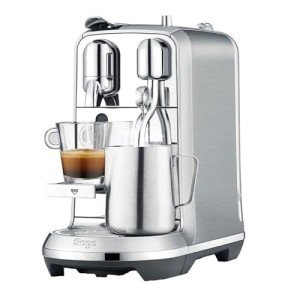Best Espresso Machines 101: It's The Complete Guide For Beginners

Best Espresso Machines: A Comprehensive Guide
Espresso machines have actually become a staple in coffee culture, bring in lovers and casual drinkers alike. The perfect shot of espresso can elevate the coffee experience, and selecting the ideal machine is important for accomplishing this goal. This short article dives into the world of espresso machines, checking out a few of the very best alternatives available on the marketplace today. It will cover the kinds of machines, key features to consider, a comparison table, and regularly asked questions.
Types of Espresso Machines
Before venturing into specific products, it's necessary to understand the various types of espresso machines available:
- Manual Machines: Also known as lever machines, these require the user to by hand manage the pressure and circulation of water. They offer a hands-on experience but need more skill.
- Semi-Automatic Machines: These machines automate the pressure and temperature, while enabling users to control the shot timing. They are perfect for those who wish to take control without requiring too much effort.
- Automatic Machines: These gadgets automate the developing process completely; users just pick the size and strength of the shot. Great for novices.
- Super-Automatic Machines: This type grinds the beans, tamps, brews, and even froths milk instantly. They're outstanding for benefit, making them ideal for those who desire speed without sacrificing quality.
- Pill Machines: Utilizing pre-packaged coffee pods, these are the easiest machines for making espresso. While practical, they frequently lack the depth of flavor found in freshly ground beans.
Key Features to Consider
When browsing for the best espresso machine, a number of essential functions must assist your choice:
- Pressure: The ideal pressure for an espresso machine is 9 bars. This pressure is essential for drawing out flavors successfully.
- Temperature level Control: Consistent water temperature level is important for a good espresso. Look for machines with PID (Proportional Integral Derivative) temperature level control.
- Construct Quality: Machines made from high-quality materials tend to last longer and supply a better experience.
- Size and Footprint: Consider your offered counter space. Some machines are compact, while others need significant area.
- Grinder Quality: An integrated grinder provides benefit, but the quality of the grinder impacts the last taste. Doser or doserless types alter the taste profile substantially.
- Relieve of Use and Cleaning: Consider how simple the machine is to tidy and keep. Machines with removable parts generally use much easier cleansing.
Comparison Table of Best Espresso Machines
Here's a contrast table showcasing some of the most suggested espresso machines based upon different user reviews and professional scores:
| Espresso Machine | Type | Pressure (Bars) | PID Control | Grinder Type | Cost Range |
|---|---|---|---|---|---|
| Breville Barista Express | Semi-Automatic | 9 | Yes | Cone-shaped burr grinder | ₤ 600 - ₤ 700 |
| De'Longhi EC155 | Manual | 15 | No | No grinder | ₤ 100 - ₤ 150 |
| Rancilio Silvia | Semi-Automatic | 9 | No | No grinder | ₤ 700 - ₤ 800 |
| Saeco Xelsis | Super-Automatic | 15 | Yes | Integrated grinder | ₤ 1,000 - ₤ 1,500 |
| Nespresso VertuoPlus | Capsule | N/A | No | No grinder | ₤ 150 - ₤ 200 |
| Gaggia Classic Pro | Semi-Automatic | 9 | Yes | No grinder | ₤ 400 - ₤ 500 |
Summary of Best Espresso Machines
- For Beginners: The De'Longhi EC155 is an exceptional starting point due to its affordable rate and ease of use.
- For Serious Enthusiasts: The Rancilio Silvia provides a balance in between quality and control, attracting those who want to fine-tune their barista skills.
- For Convenience: The Saeco Xelsis sticks out as a top super-automatic option, best for users looking for maximum ease without jeopardizing taste.
Often Asked Questions (FAQs)
Q1: What is the best pressure for drawing out espresso?A1: The perfect pressure is 9 bars; this pressure level is ideal for extracting the flavors in espresso.
Q2: How frequently should I clean my espresso machine?A2: Regular cleaning is essential. For machines with integrated grinders, it is best to clean them after every use. Deep cleansing must be done weekly or month-to-month depending on usage and design.
Q3: Can I use routine coffee in an espresso machine?A3: Espresso is made from finely ground coffee, ideally roasted specifically for espresso. While Home Page can use regular coffee, the taste and extraction might differ.
Q4: How long can my espresso machine last?A4: With correct care and maintenance, a high-quality espresso machine can last numerous years, even years.
Q5: What grinder should I use for espresso?A5: A burr grinder is more effective, as it provides constant grind size which is important for proper extraction.
The journey to finding the very best espresso machine can be an amazing one, filled with discovery and capacity for developing one's coffee taste buds. Whether opting for the simplicity of a capsule machine or the control of a manual model, knowing the various types and features can considerably improve the experience. With advances in innovation and development, there's an appropriate espresso machine for all preferences and skill levels on the market today. Buying the best machine not just promises great taste but also raises the total coffee experience.

